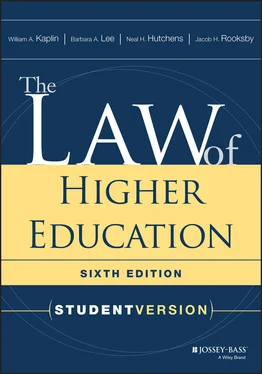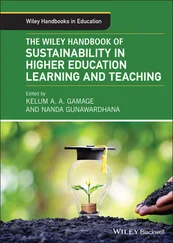A teacher, like the respondent, who has held his position for a number of years might be able to show from the circumstances of this service—and from other relevant facts—that he has a legitimate claim of entitlement to job tenure. Just as this Court has found there to be a “common law of a particular industry or of a particular plant” that may supplement a collective bargaining agreement ( United Steelworkers v. Warrior & Gulf Nav. Co ., 363 U.S. 574, 579…(1960)), so there may be an unwritten “common law” in a particular university that certain employees shall have the equivalent of tenure [408 U.S. at 602].
Sindermann was a constitutional due process case, and academic custom and usage was relevant to determining whether the professor had a property interestin continued employment that would entitle him to a hearing prior to nonrenewal (see Section 5.7.2). Academic custom and usage is also important in contract cases in which courts, arbitrators, or grievance committees must interpret provisions of the faculty-institution contract (see Sections 5.2and 5.3) or the student-institution contract (see Section 7.1.3). In Strank v. Mercy Hospital of Johnstown , 117 A.2d 697 (Pa. 1955), a student nurse who had been dismissed from nursing school sought to require the school to award her transfer credits for the two years' work she had successfully completed. The student alleged that she had “oral arrangements with the school at the time she entered, later confirmed in part by writing and carried out by both parties for a period of two years,…[and] that these arrangements and understandings imposed upon defendant the legal duty to give her proper credits for work completed.” When the school argued that the court had no jurisdiction over such a claim, the court responded: “[Courts] have jurisdiction…for the enforcement of obligations whether arising under express contracts, written or oral, or implied contracts, including those in which a duty may have resulted from long recognized and established customs and usages, as in this case, perhaps, between an educational institution and its students” (117 A.2d at 698). Similarly, in Krotkoff v. Goucher College , 585 F.2d 675 (4th Cir. 1978), the court rejected another professor's claim that “national” academic custom and usage protected her from termination of tenure due to financial exigency. The court discussed in its opinion that the professor failed to establish a local understanding of tenure at the college that precluded dismissal of tenured faculty due to financial exigency.
Asserting that academic custom and usage is relevant to a faculty member's contract claim may help the faculty member survive a motion for summary judgment. In Bason v. American University , 414 A.2d 522 (D.C. 1980), a law professor denied tenure asserted that he had a contractual right to be informed of his progress toward tenure, which had not occurred. In this case, the court reversed a trial court's summary judgment ruling for the employer, stating that “resolution of the matter involves not only a consideration of the Faculty Manual, but of the university's ‘customs and practices.’ … The existence of an issue of custom and practice also precludes summary judgment” (414 A.2d at 525). The same court stated, in Howard University v. Best , 547 A.2d 144 (D.C. 1988), “[i]n order for a custom and practice to be binding on the parties to a transaction, it must be proved that the custom is definite, uniform, and well known, and it must be established by ‘clear and satisfactory evidence.’” Plaintiffsare rarely successful, however, in attempting to argue that academic custom and usage supplants written institutional rules or a reasonable or consistent interpretation of institutional policies (see, for example, Brown v. George Washington University , 802 A.2d 382 (D.C. App. 2002)).
The criteria needed to establish academic custom and practice can also apply to and constrain institutional action. In Howard University v. Roberts-Williamson , 37 A.3d 896 (D.C. 2012), a university argued that while it had not provided formal biennial reviews to a faculty member as specified in the faculty handbook, the faculty member had received sufficient feedback regarding her performance. The court rejected this argument, stating that the university failed to establish by “clear and satisfactory” evidence a custom or practice of “accepting something short of an actual biennial evaluation” as called for in the faculty handbook (37 A.3d at 908).
Custom and usage may also sometimes apply to outsiders who are not members of the campus community. A federal appellate court cited a university's unwritten custom of barring all “uninvited” individuals from speaking on the “library lawn” in Gilles v. Blanchard , 477 F.3d 466 (7th Cir. 2007). In the case, an itinerant preacher, Gilles, had attempted to preach on the library lawn of the Vincennes University, a public university. The university cited its policy of requiring that anyone speaking on campus property be invited by a faculty member or student; Gilles had not been invited to speak. Rejecting Gilles's First Amendment claim, the court noted that the university's custom and practice was content-neutral and thus not a violation of Gilles's right to free speech.
1.4.4 The role of case law.Every year, the state and federal courts reach decisions in hundreds of cases involving postsecondary education. Opinions are issued and published for many of these decisions. Many more decisions are reached and opinions rendered each year in cases that do not involve postsecondary education but do elucidate important established legal principles with potential application to postsecondary education. Judicial opinions (case law) may interpret federal, state, or local statutes. They may also interpret the rules and regulations of administrative agencies. Therefore, in order to understand the meaning of statutes, rules, and regulations, one must understand the case law that has construed them. Judicial opinions may also interpret federal or state constitutional provisions and may sometimes determine the constitutionality of particular statutes or rules and regulations. A statute, rule, or regulation that is found to be unconstitutional because it conflicts with a particular provision of the federal or a state constitution is void and no longer enforceable by the courts. In addition to these functions, judicial opinions also frequently develop and apply the common law of the jurisdiction in which the court sits. And judicial opinions may interpret postsecondary institutions' “internal law” ( Section 1.4.3) and measure its validity against the backdrop of the constitutional provisions, statutes, and regulations (the “external law”; Section 1.4.2) that binds institutions.
Besides their opinions in postsecondary education cases, courts issue numerous opinions each year in cases concerning elementary and secondary education (see, for example, the Wood v. Strickland case in Section 4.4.4. and the Goss v. Lopez case in Section 9.3.2). Insights and principles from these cases are often transferable to postsecondary education. But elementary or secondary precedents cannot be applied routinely or uncritically to postsecondary education. Differences in the structures, missions, and clienteles of these levels of education may make precedents from one level inapplicable to the other or may require that the precedent's application be modified to account for the differences. (For an example of a court's application of precedent developed in the secondary education context to a higher education issue, see the discussion of Hosty v. Carter in Section 10.3.3.)
Читать дальше












